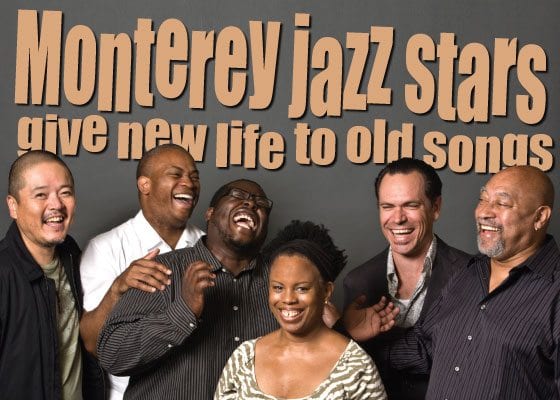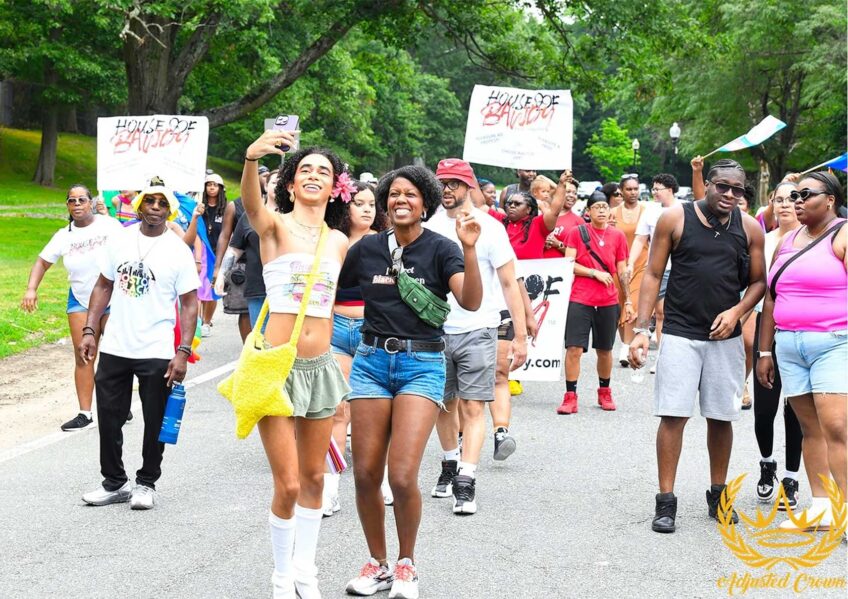
Words were a powerful presence in the elevating evening of jazz performed by the Monterey Jazz Festival on Tour last Thursday at the Berklee Performance Center.
Whether sung, implied or reinvented, lyrics accompanied most of the selections by the all-star ensemble, comprising pianist Kenny Barron, jazz violinist Regina Carter, vocalist Kurt Elling, guitarist Russell Malone, Johnathan Blake on drums and Kiyoshi Kitagawa on bass.
Presented by the Celebrity Series of Boston, the concert was an early stop on the group’s nationwide itinerary. An annual production of the Monterey Jazz Festival, its Festival on Tour brings together renowned jazz musicians, who coalesce into a collaborative unit in the course of weeks on the road.
Considered one of the greatest jazz pianists performing today, Kenny Barron is an elegant and agile musician with a muscular stride undertone when he wants it. Barron and his frequent collaborators, Kitagawa and Blake, were the spine of the ensemble. Barron’s spare phrasings and restraint injected both swinging momentum and quiet interludes within the group’s free-flowing improvisations.
If Barron was the ensemble’s backbone, Carter was its heart, her generosity and warmth infusing her selections and her give-and-take with her fellow musicians.
Elling was the group’s host and voice, not only as the singer on duty but also the spokesman introducing the program. A dapper figure, Elling described the ensemble as “a collective” and a “supergroup” and spoke of their tour as “a special project” with a program that varies from night to night. Its simple, egalitarian format lets each featured artist choose a few songs.
Gifted with a rich baritone that spans four octaves, Elling turned to music after graduate study at the University of Chicago Divinity School. Like Carter, he quickly rose to fame and routinely tops critics’ and readers’ polls as best male jazz vocalist. His 2009 album “Dedicated to You: Kurt Elling Sings the Music of Coltrane and Hartman” received the 2010 Grammy Award for Best Jazz Vocal Album.
Like the legendary jazz singer Jon Hendricks, whom he speaks of as “a father figure,” Elling is a master of “vocalese,” the practice of adding lyrics to jazz instrumentals. Elling is eclectic, even exotic, in his sources, writing original lyrics but also setting lines from Walt Whitman and beat poet Kenneth Rexroth to jazz compositions.
Trained on the Suzuki violin when she was a toddler in Detroit, Carter grew up around jazz and also played in the city’s symphony orchestra. She was inspired to master the jazz violin after hearing Stéphane Grappelli in concert. In 2001, Carter traveled to Genoa, Italy to play the hallowed 1743 Guarneri violin of Niccolò Paganini (1782 – 1840), becoming the first jazz musician and African American to do so. The following year, she returned to record “Paganini: After a Dream” on the violin.
In 2006, Carter received a $500,000 fellowship, known as a “genius grant,” from the John D. and Catherine T. MacArthur Foundation.
Carter introduced her first selection, “When I Grow Too Old to Dream,” a standard written by Oscar Hammerstein II and Sigmund Romberg for the 1935 film, “The Night Is Young.”
Carter included it in her 2006 album dedicated to favorite songs of her late mother. Although he is sometimes prone to baroque elaboration, here Elling’s singing held to the sweet simplicity of its lyrics as Carter swung and soared her way through the song accompanied by Barron’s spare, percussive keystrokes and Kitagawa’s sauntering bass.
Barron then played his composition, “New York Attitude.” Blake complemented Barron’s brisk, rippling notes with fluid drum work as Kitagawa, his arms curved in graceful arcs, coaxed sinuous lines from his base.
Guitar virtuoso Russell Malone chose to solo and assured listeners that they would recognize his selection, a song by Alex North. Few did. His oceanic rendering of “Unchained Melody” barely touched down to spin a familiar thread of the pop hit. Instead, he embroidered layers of delicate harmonic improvisation that filled the hushed hall.
The musical traditions of Brazil, Latin America and the West Indies inflect Barron’s wide-ranging repertoire. As he performed his composition “Calypso,” Carter plucked the strings of her violin to its infectious beat, turning her instrument into a supple percussive tool.
Barron kept his cool, punctuating tuneful phrases with rhythmic pauses while an ecstatic drum solo by Blake flipped, turned, and spun around the axis of the song.
A selection by Elling entitled “And We Will Fly” recasts an impressionistic composition by jazz pianist Alan Pasqua, “Highway 14,” a wordless paean to the scenic old road between Santa Fe and Albuquerque that winds through mesquite-pocked hills and old mining towns.
Elling adds lyrics that translate Pasqua’s music into an expansive ode to the pleasures of sea and sky in Monterey. As he sang, his baritone glided over and under the melody like a seagull riding a breeze.
Bringing the music back to earth in the most lyrical way, Carter turned to another ‘30s classic, “Georgia on My Mind.” Hoagy Carmichael created the melody and Stuart Gorrell wrote the lyrics; but Ray Charles immortalized the song.
The spare, moving duo by Barron and Carter left room to imagine Charles’ voice. The two shared phrases and traded improvisations, and, with his firm striding hand backing her swinging exploration, Carter took a meandering detour into a few lines from the hymn, “Amazing Grace.”
Next, Barron introduced his composition, “Theme No. 1,” wryly noting that he wrote it “for a film you’ll never see.” Against Barron’s spare, easy-going groove, Malone spun gorgeous swirls of notes on his guitar.
Among the concert’s many high points was Elling’s vocalise version of the Duke Ellington composition, “I Like The Sunrise.” Accompanied by the ensemble, Elling began by singing the soulful original, with lyrics by Mitchell Parish, which unfolds like a psalm.
Then Elling added his own movement, combining an improvised melody to this music by tenor saxophonist Von Freeman with a passage from 13th century Persian poet Rumi that celebrates the endurance of music and song. It was a fitting benediction to an evening in which jazz musicians of consummate artistry gave new life to old songs.
After two spirited sets, the concert came to a close. Barron treated those who lingered after the applause to an encore. In a stride-inflected, story-telling style he gave an ebullient rendering of the 1930 standard, “I’m Confessin’ (That I Love You)”— delivering an early valentine to a smitten crowd.






